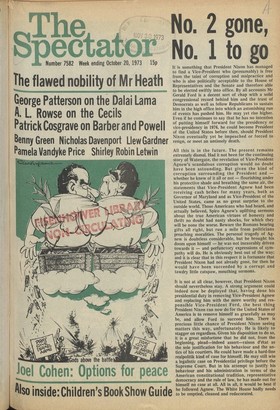No. 2 gone, No. 1 to go
It is something that President Nixon has managed to find a Vice-President who (presumably) is free from the taint of corruption and malpractice and who is also politically acceptable to the House of Representatives and the Senate and therefore able to be elected swiftly into office. By all accounts Mr Gerald Ford is a decent sort of chap with a solid congressional record behind him and the trust of Democrats as well as fellow Republicans to sustain him in the high office into which an astonishing run of events has pushed him. He may yet rise higher. Even if he continues to say that he has no intention of putting himself forward for the presidency or vice-presidency in 1976, he could become President of the United States before then, should President Nixon eventually yet be impeached or forced to resign, or meet an untimely death.
All this is in the future. The present remains extremely dismal. Had it not been for the continuing story of Watergate, the revelation of Vice-President Agnew's scandalous corruption would no doubt have been astounding. But given the kind of corruption surrounding the President and — whether he knew of it all or not — flourishing under his protective shade and breathing the same air, the statements that Vice-President Agnew had been receiving cash bribes for many years, both as Governor of Maryland and as Vice-President of the United States, came as no great surprise to the outside world. Those Americans who had heard, and actually believed, Spiro Agnew's uplifting sermons about the true American virtues of honesty and thrift no doubt had nasty shocks, for which they will be none the worse. Beware the Romans bearing gifts all right, but run a mile from politicians preaching moralities. The personal tragedy of Agnew is doubtless considerable, but he brought his doom upon himself — he was not inexorably driven towards it — and perfunctory expressions of sympathy will do. He is obviously best out of the way; and it is clear that in this respect it is fortunate that President Nixon had not already gone, for then he would have been succeeded by a corrupt and tawdry little catspaw, mouthing sermons.
It is not at all clear, however, that President Nixon should nevertheless stay. A strong argument could indeed now be deployed that, having done his presidential duty in removing Vice-President Agnew and replacing him with the more worthy and responsible Vice-President Ford, the best thing President Nixon can now do for the United States of America is to remove himself as gracefully as may be, and allow Ford to succeed him. There is precious little chance of President Nixon seeing matters this way, unfortunately. He is likely to stagger on regardless. Given his disposition to do so, it is a great misfortune that he did not, from the beginning, plead—indeed assert—raison d'dtat as the sole justification for his behaviour and the antics of his courtiers. He could have made a hard-line realpolitik kind of case for himself. He may still win a legalistic case on Presidential privilege before the Supreme Court. But in his attempt to justify his behaviour and his administration in terms of the American constitutional tradition, representative democracy and the rule of law, he has made out for himself no case at all. All in all, it would be best if he followed Agnew. The White House badly needs to be emptied, cleaned and redecorated.


































































